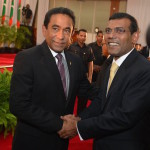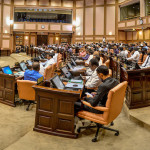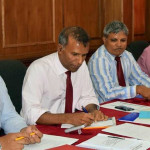Education Minister Dr Aishath Shiham informed the press yesterday of “significant changes” brought to the education sector during the first year of the current administration, including introduction of Quran as a subject for grades one to seven, Arabic language in 20 schools, and vocational training.
“Historic work” has been done during the year under the ‘No Child Left Behind’ education policy, Dr Shiham said at yesterday’s press conference.
In addition to the science, business, and arts streams in secondary education, Dr Shiham said a new “vocational education stream” would be introduced next year.
A pilot programme has been conducted this year in eight schools in Malé with 188 students, and four schools in the atolls with 279 students, she said.
She noted that the ‘B-tech’ diploma level two certificate awarded for vocational training was of the same standard or qualification as the O’ Level certificate.
The number of students who fail O’ Levels – the pass rate for which was 46 percent in 2012 – and “get left behind” would be significantly reduced as a result, she added.
Moreover, 68 students from grades eight and nine were currently studying polytechnic courses for a level three certificate, she continued, which was also of the same standard as the O’ Level certificate.
The ‘Dhasvaaru’ programme launched this year meanwhile involved identifying disinterested or poor students, she explained, of which 180 students have started working in 30 private and government-owned companies.
Opposition concerns
In an open letter – signed by former education minister Dr Musthafa Luthfy – sent to the education ministry last week, the opposition Maldivian Democratic Party’s (MDP) education committee expressed concern with students allegedly being deprived of secondary education in favour of vocational training.
Under the new policy, the MDP noted that certain students are “labelled” as poor at grade eight and taught only Dhivehi, Islam, Mathematics, and English without a plan or approved curriculum.
“And after teaching these four subjects at school, students are to be sent to private parties in the name of teaching work,” the letter stated, noting the absence of a curriculum or syllabus for training the students.
The education committee also contended that singling out certain students for “second class” vocational education would become an obstacle in the future to conducting programmes for all secondary school students.
Moreover, the state’s “discrimination” among students would create problems for social equality, peace, and stability in the future, the letter added.
Offering a “narrow” education to selected students from age 14 onward would also prevent schools from providing remedial or special assistance to bring the students up to the average standard, the education committee argued.
The letter also noted that vocational training was not reserved for students with low grades under the new education curriculum framework.
“Achievements”
Education Minister Dr Shiham meanwhile referred to designating two schools – in Kulhudhufushi and Addu City – for Arabic medium instruction as a “very big achievement.”
Moreover, Dhivehi, Islam, and Quran were being taught to 417 Maldivian children in Sri Lanka while efforts were underway to provide the subjects to Maldivians residing in Trivandrum, India.
A volunteerism programme would also be conducted in all schools across the country next year, she continued, and life skills training has been offered in 180 schools this year after training 196 teachers.
Additionally, orientation programmes have been conducted to introduce civic education in 2015 and resource packs have been prepared.
Among other first year achievements listed in a document shared with the media yesterday included establishing five units in five islands for children with special needs and two early intervention centres in Kulhudhufushi and Fuvahmulah.
While MVR17 million (US$1.1 million) was spent this year to provide facilities such as furniture and computers to schools, 96 classrooms have been constructed and work was underway on constructing 128 further classrooms.
Additionally, MVR1.5 million (US$97,276) was spent to improve school laboratories and MVR1 million (US$64,850) was spent to purchase exercise equipment for schools.
Under an agreement signed with the health ministry in February, 5,792 grade one students have been screened so far and a child protection policy has been formulated.
While 16 school counsellors have completed a four-month online “solution focused brief therapy” course offered by the University of Wisconsin, a survey to assess physical and psychological health of students is expected to be completed on November 16.
More than 1,000 higher education opportunities have been offered this year as student loans and scholarships.
As part of preparations to roll out the new curriculum in 2015, 239 “curriculum ambassadors” and 1,820 principals and teachers have been trained.





Teaching children of the mythical sea monsters in Mongolian wouldn't help them ever, in their future.
Neither does stories about flying horses in tutu language.
Teach the children English, Chinese as a second language, science math and arts, that is those that will help them in their careers.
Teaching arabic is great and brings closer to Islam. More focus must be on Quran and deen.
It is irresponsible of shadow minister to label vocational training as " second chance" learning she obviously has done her research.
School based training is successful world wide and is perfect for the school students of the Maldives.
The publics perception needs to change towards schools program's in vocational training. For grade 10 or 12 students to finish school with Cambridge qualifications and a vocational qualification is going to make students job ready.
@Kasim
If teaching Arabic brings people closer to Islam,then the best muslims are in Saudi Arabia and,generally in middle east including Israel.It is not a language which brings people closer to goodness (if what you are suggesting is that religion is good ).from the madrasas of Pakistan,yemen and Saudi Arabia hails the students who have been "emphasized" with quran and deen.But does that make them better humans.The same case with Arabia.There are a group of people who really believe that Arabia brings the best in kids. On this belief they are trying to introduce all arab medium schools in the country. Are we not succumbing to hypocrisy when we consider English language as the medium of everything, including "dhauwa" (bilal Philips is much more popular than fareed or ilyas).And the trend will continue to grow and gain momentum.We are depriving those kids of an opportunity of jobs an and a better life.are we trying to emulate Cambodia or srilanka by opening seminaries for monks.Nothing wrong in teaching arab and it has to be taught,nothing wrong in learning a language.But please don't correlate it with religion and don't consider it as the magic bullet which will solve all the social and economical ills which we are expiereincing.What we are seeing is a direct result of Maumoon and other leaders failiure to build a nation,rather they build a strong state.this has nothing to do with religion or peoples beliefe.Income disparity,thirdworld politics economic injustice and a gross failiure to build a nation.We have a country full of people who are ignorant and had been fed with a lethal concoction of nationalism and "superior Maldivian" poison
@hero
Our hero is real believer of the ARABIC thingee
So teaching Arabic and the Quran makes for better citizens? Really?
Then why are the students of Saudi Arabia, Afghanistan, Yemen and Pakistan the dumbest in the world?
With no industry to speak of, the educational sector in Maldives should concentrate on vocational training in the hospitality and fishing sectors.
You can only claim to have achieved 'significant changes' in your educational system when you no longer need to send your students to India for higher studies.
Let us hope that day arrives soon.